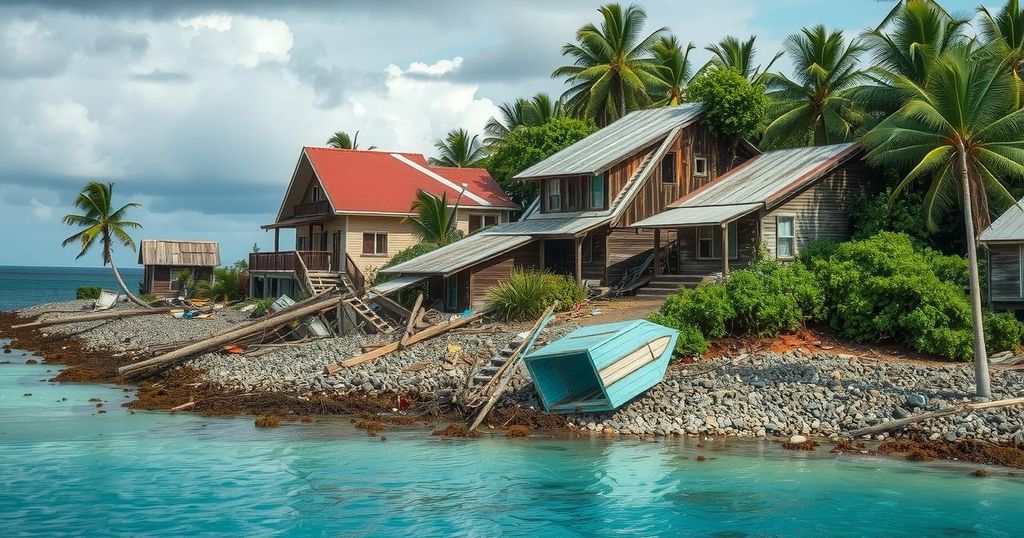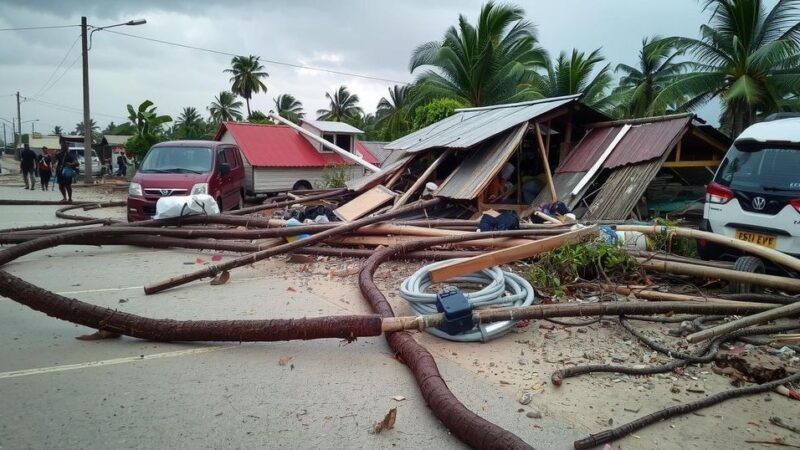Cyclone Chido has severely impacted Mayotte, resulting in hundreds, possibly thousands, of deaths and widespread destruction. Emergency responders face challenges with access to hard-hit areas as the storm left vital services inoperative. Humanitarian aid is urgently needed as survivors begin to confront the catastrophic aftermath and efforts toward recovery are underway.
Cyclone Chido has tragically wreaked havoc in Mayotte, an island territory of France in the Indian Ocean, leading to a catastrophic loss of life and widespread devastation. Reports indicate that hundreds, possibly thousands, of individuals are feared dead following the storm, which struck as a Category 4 cyclone—one of the most powerful storms to hit the region in nearly a century. As survivors venture out, they are confronted with the grim reality of collapsed buildings and essential infrastructure rendered inoperative.
The French government has mobilized resources, with Interior Minister Bruno Retailleau visiting the island to oversee emergency responses. Despite their efforts, the extent of the destruction has left many areas unreachable, complicating rescue and recovery operations. Hospitals are operational, but there is a significant shortage of electricity and potable water, which raises concerns about the well-being of the affected population.
Inhabitants describe the situation in Mayotte as chaotic, with neighborhoods completely flattened and vital services disrupted. Some residents ignored evacuation warnings leading up to the cyclone, underestimating its potential severity, while many undocumented migrants faced additional fears that prevented them from seeking shelter. Humanitarian organizations are attempting to provide immediate relief, but the logistical challenges are enormous as officials estimate the actual death toll may be considerably higher than currently reported.
In line with past cyclone seasons, Mayotte’s experience reflects a broader regional vulnerability, where seasonal cyclones frequently inflict damage on impoverished communities. Following Cyclone Chido, an urgent need for both local and international aid to assist in recovery and rebuilding efforts is evident. As the cyclone moves beyond Mayotte, neighboring countries are bracing for its effects, highlighting the need for continued vigilance and preparedness against such natural disasters.
Mayotte, located approximately 5,000 miles from France, is one of France’s poorest territories and has a rich history of cyclonic activity. Cyclones pose a significant threat to the island and surrounding regions, particularly during the cyclone season from December to March. Cyclone Chido has been deemed one of the most destructive storms in recent times, directly impacting Mayotte while also affecting Comoros and Madagascar. The region has experienced a sequence of severe cyclones in recent years, underscoring a trend in intensified weather patterns that devastate vulnerable communities. Governments and humanitarian organizations are often stretched thin in their capacity to manage the aftermath of such disasters, revealing persistent challenges in disaster preparedness and response.
The devastation caused by Cyclone Chido in Mayotte is a stark reminder of the vulnerability of island communities to natural disasters. The immediate aftermath reveals a pressing need for aid and infrastructure rehabilitation in one of France’s most impoverished territories. As emergency operations continue and the region braces for potential repercussions elsewhere, it is evident that comprehensive strategies are critical to mitigate the impacts of future cyclones. This disaster underscores the importance of international cooperation and preparedness in addressing the challenges posed by extreme weather events.
Original Source: weather.com







